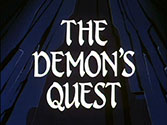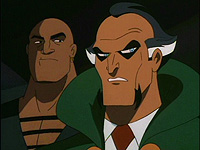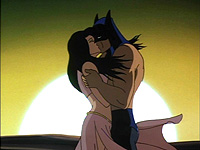|
||
|
| Credits | Cast | |
Written by Dennis O'Neil (I) Story by Dennis O'Neil & Len Wein (II) Teleplay by Len Wein (II) Directed by Kevin Altieri Music by Michael McCuistion (I) & Harvey R. Cohen (II) Animation by Tokyo Movie Shinsa |
Kevin Conroy as Bruce Wayne Loren Lester as Dick Grayson David Warner as Ra's al-Ghul George Dicenzo as Ubu Charles Howerton as Captor Helen Slater as Talia Frank Welker as Thug |
|
|
Each of these art forms has its weaknesses, of course, which are only accentuated when each tries to be of a different kind. Film's great power derives from its illusion of naturalness; the very burden of flesh and blood and stone and water gives the people and their environment a moral gravity. When cartoons or comic books try the same thing they become wordy or melodramatic; two-dimensional surfaces are too fragile to support the same weight. As mediums of movement, neither cartoon nor film can indulge the magnificently artistic gesture of the comic book without becoming self-consciously static. And no matter how gifted he is, John Cleese will never move with the sublimity of Chuck Jones's Daffy Duck; nor, of course, will Frank Miller's Dark Knight. The best episodes of BTAS respect the limits of each of these forms while partaking of their strengths as far as possible. So the series aspires to tell stories of characters with recognizable human powers and frailties, revealed through the control of action and plot, and issuing in a cathartic climax that allows us to make judgments about the events we have witnessed. But it must be quick and evocative in its approach: not only the demands of television but the flitting and illusory nature of the craft requires that each story be told before the audience realizes that the characters they are being asked to identify with will never achieve even the thin reality of a Bob Saget, let alone the thicker reality of a Hamlet. And they must resist the temptation to let the idea of an episode substitute for the hard work of drawing it out. With comic books the reader can and must supply the movement, development and depth that occurs between and within the inked panels. An animated story, however, needs to be more than a story-board that some in-betweeners have been at.
This is, in short, an episode in which the attributes of a good comic book—scope, stylish character design, allusiveness in place of discursiveness—are indulged in with devastating results. Momentum substitutes for development, and scenery for setting. It's very pretty, but it is all too easy for the mind to wander. I would point to "Avatar" as an episode which has almost all the same virtues—visual sweep, David Warner, Talia in a languid, windswept pose—but which also possesses the vitality that comes from a cheerful refusal to take itself seriously. This latter characteristic, we might remember, is also supposed to be a virtue of the comic book form. |
|
|
|
Related Episodes |
What Others Are Saying ... |
| Back to Deep Freeze |
Forward to Dreams in Darkness |



